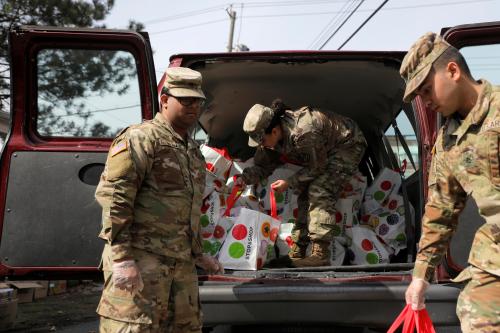Thus far, more people are feeling the economic consequences of the Coronavirus than the disease itself. In only a few weeks, we’ve moved from worrying about airlines in Rome and Shanghai to having our friends laid off and losing the restaurant down the block.
Both Democrats and Republicans in Congress and, belatedly, the Administration understand that unless the Federal Government acts, acts quickly and smartly, tens of thousands of businesses will shut down and millions will soon be out of work. Several million already are. Democrats in both the House and Senate, Senate Republicans, and the Trump Administration have all made proposals. Senator McConnell, on behalf of Senate Republicans, yesterday introduced a full bill.
Now the challenge is reaching agreement on what, specifically, to do. The Administration and Congress face some difficult, but urgent choices. If they delay, millions will be laid off as businesses, losing their customers, try to save their cash. Yet we know that, as happened in 2009/10, some of the businesses that need help today will do stupid things with their cash in the months ahead – and the President and Congress will be blamed for having “bailed them out”.
The President has made it clear that he wants to provide financial assistance to airlines, cruise companies, hotels, casinos, and many other large businesses affected by COVID. There is ample precedent for such aid from each of the last three presidential administrations. In the late 1990’s, I worked on a federal loan program for the steel industry. It was followed by one for airlines. Similarly, after the Great Recession, there was support not only for the financial system, but also for US automobile companies; without that support, millions of jobs would have been lost and it is unlikely that GM or Chrysler would exist today.
However, these programs must be designed to (a) preserve business services and employment, (b) avoid becoming a payoff to a business’s executives or stockholders, and (c) very quickly.
As one who ran an airline in bankruptcy, worked with steel companies and steelworkers and then helped design federal loans for industry, I’ve been on both sides of this fraught debate. Here are a few suggestions for Congress and the Administration.
Go with Version 1.0. Allow Updates.
Speed matters. Businesses are not going to keep employees on payroll, much less return them having already laid them off, until they know for sure both that help is coming soon (and that keeping people on payroll is required). Agencies should, however, be given some flexibility to administer the programs without having to return to Congress.
No Blank Checks. Congress can & should set conditions.
Aid Should Keep Businesses Open & People Working. Since airlines and auto companies are already shutting down operations and laying off employees, Congressional Democrats have continually focused on concern for those who work in a distressed business. They have argued federal assistance should be conditioned on companies continuing to pay a high percentage of their workforce at a high percentage of normal pay. Congressional Democrats included such a requirement – for paid sick leave — in the Families First Coronavirus Response Act, enacted into law this past week. (Businesses payments under the program will be repaid via tax credits.)
Senator McConnell’s bill includes worker assistance requirements as part of a large small business loan program: those loans will be forgiven to the extent they’re used to keep employees on payroll at current wages over the next four months.
Inexplicably, however, Senator McConnell included no such requirement in the $208,000,000,000 (yes, billion) of loans and loan guarantees for airlines and other large businesses. Airlines, cruise ship companies, and whichever other businesses the Treasury Department considers “distressed” could continue to lay off their workers yet receive subsidized loans from taxpayers. (The bill does allow the Department of Transportation to require an airline to maintain some service to some cities it currently serves — if DOT chooses to do so and if “reasonable and practicable” – but even if the provision ever were used airlines would nonetheless still be able to lay off large fractions of their employees.)
This lack of accountability is a sharp departure from previous federal business assistance programs. The steel industry loan programs in the late 1990’s, the airline loan programs in the Bush administration, and the auto industry authority used by both Bush and Obama administrations all required submission of a business plan and those plans were scrutinized carefully to ensure that industry employment, not just the corporate treasury, was preserved.
Loan funds should go to help businesses, their customers, and their employees, not be paid out to stockholders. One already public dispute is whether assisted companies should or should not be permitted to buy back shares. Before it was enacted in 2017, proponents claimed the Tax Cut & Jobs Act would result both in higher wages and greater business investment. In fact, most of the cut was returned to shareholders in the form of dividends and stock buybacks. Such buybacks are widespread throughout industry, but they benefit primarily shareholders and managements who own shares, not other stakeholders. If federal support is intended primarily to support workers, suppliers, and customers, then limitations on buybacks and dividends are an appropriate condition for that aid.
Aid shouldn’t fund high executive pay. Less politically controversial, but much more difficult to implement consistently, are limitations on executive pay. In 2009, Treasury officials found themselves in the embarrassing position both of having some institutions refuse to participate in the TARP because of tightened compensation limits and of being unable to prevent AIG from paying tens of millions in bonuses to executives from the very financial products division that had bankrupted AIG in the first place. The McConnell bill does say that the pay of highly-compensated executives cannot be increased over the next two years, but requires no reductions and leaves open the possibility of higher deferred compensation payments once the two-year period has expired. Congress should instead require that there must be some documented reduction of total compensation, perhaps by a fixed percentage, as a condition of assistance. To avoid a repeat of the AIG fiasco, there should be an ability for the Treasury to modify, but not eliminate, these requirements.
BUT government has never been both fast and perfect, so allow for changes. This means that loan and grant programs have to be flexible. This will frustrate Congress, which doesn’t like to give much discretion to any administration, but unless there’s room for mid-course corrections the risk that a program will either be ineffective or, more likely, embarrassing increases. One way to preserve flexibility is to shorten the term of loans to cover the next six months, but allow for extension with different conditions. Loan programs should not be long-term, but they should be renewable.
Bigger Businesses Should be More Accountable
Most businesses in America are not in the Fortune 500. They are small. They don’t have the time or the people to come to Washington and negotiate for a loan or a grant. They will have to look for help to the Small Business Administration. The McConnell bill recognizes this by using the well-established SBA 7(a) loan program, expanding it to include distressed non-profits, and lending enough to cover 4 months of payroll, rent, mortgage, etc. It also includes a provision to forgive the loans to the extent they are used for payroll over the next 4 months.
Major businesses, however, are more visible. They must be much more accountable than the restaurant down the street. Although many of the conditions discussed above can apply in some way to smaller businesses, for larger businesses there should be more specificity and greater accountability. (There’s no reason to exempt them from conditions we impose on small businesses, as the McConnell bill does.) Fortunately, they have the lawyers and accountants to handle it. Ultimately, Congress and the Administration will be judged by the actions of companies whose names we already know.
There’s More Than One Way to Get Money to Workers
Both politicians and economists recognize that the best way to recover from the Coronavirus recession is for Americans, regardless of layoffs, lockdowns and quarantines, to have funds to pay for food, shelter and the other requirements of life. The challenge is how to get funds to them. The President initially proposed cutting payroll taxes, until it was pointed out that this would help people only gradually and wouldn’t help those not on a payroll at all. The debate has now turned to other alternatives. The best approach is to stop trying to find a single approach and use several channels.
The fastest way to get money to people is to keep their paychecks coming. Businesses need to know now both that there will be federal aid and that they need to keep paying their workers close to normal pay in order to get it. However, that aid will need to be substantial. As noted above, it will likely come “with strings attached” and many businesses will still conclude they’re better off with only half their workforce.
The second fastest way to get money to people is a check from the IRS. Both Senate Republicans and the Administration now support this idea (ignoring the fact that it was proposed by the Chair of President Obama’s Council of Economic Advisers). Secretary Mnuchin says the IRS could put a $1,000 check for each adult in the mail by the end of April. Furthermore, the government could require that our payment system clear the checks immediately, so that already vulnerable Americans could use banks instead of payday lenders.
Better unemployment insurance is a great idea, but not a quick one. Many, notably Senate Democratic Leader Charles Schumer, argue persuasively for better unemployment insurance. This is clearly a good idea: it would provide aid targeted to those individuals and communities who need it most. However, changes to unemployment insurance become the responsibility of fifty different state employment agencies, each with its own application procedures and (often ancient) IT systems. The arguments for making these improvements in a time of widespread recession are strong, and Congress should enact them, but along with the IRS payments already under discussion.
* * *
Everyone now recognizes that our country is in peril, that many will die, and many more will undergo severe economic hardship. As New York’s Governor Andrew Cuomo pointed out, however, the nation now really needs the federal government. If Congress and the President move, they can provide comfort to tens of millions. Let’s hope they do.
The Brookings Institution is committed to quality, independence, and impact.
We are supported by a diverse array of funders. In line with our values and policies, each Brookings publication represents the sole views of its author(s).







Commentary
Op-edHow to help businesses and their workers survive COVID without bailouts or blank checks
March 20, 2020